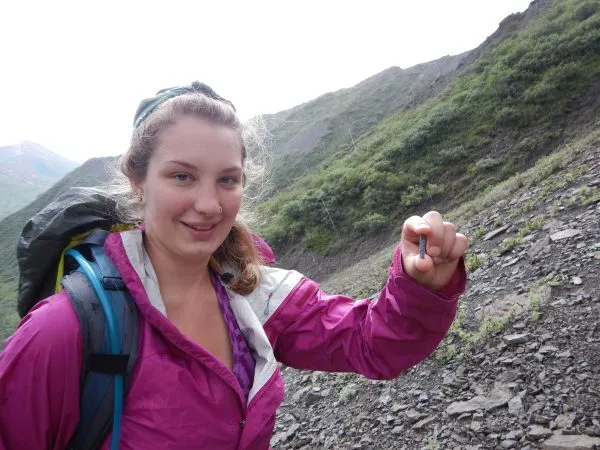First Dinosaur Fossils Discovered in Alaska’s Denali National Park
Paleontologists found four small fragments of dino fossils, proving the acidic soil 70 million years ago could have preserved bones
/https://tf-cmsv2-smithsonianmag-media.s3.amazonaws.com/filer/38/fa/38fac728-3c75-48a7-addc-074e90cd2ab8/16_denalidino-4-600x450.jpg)
Denali National Park in central Alaska is a treasure trove for paleontologists. Remains of plants and animals particularly abound in the 70-million-year-old Cantwell Formation, which was once a silt-filled basin. Using these fossils, researchers have even reconstructed most of Denali’s Cretaceous-era ecosystem, when the region was a high polar forest. But until now, one really big element was missing: Dinosaurs.
That’s why four tiny fragments of dino fossils discovered in Denali during a July survey—the first ever found in the park—have paleontologists excited. Researchers previously believed that the decaying plant matter in the sediments of the Cantwell Formation may have made the soils too acidic for bones to fossilize, reports Yereth Rosen at Alaska Dispatch News. But these latest fossils suggest otherwise.
Pat Druckenmiller, curator of Earth sciences at the University of Alaska's Museum of the North, and a team of paleontologists and students found the four fragments in a valley in the park. One piece is two inches long and one has already been recognized as a bit of fossilized tendon from a hadrosaur species, the duck-billed dinosaurs that were likely common in the area at the time. Another piece is the end of a limb from a medium-sized dino. Druckenmiller hopes the fragments, which were likely at one point parts of larger fossils, indicate that there may be more intact bones present in the park.
Though researchers have always thought that dinosaurs likely roamed the Denali area, the first evidence didn’t appear until 2005 when students from the Univeristy of Alaska Fairbanks participating in a geology field camp found the preserved footprint of a theropod dinosaur. Since then, researchers have found thousands of tracks in Denali, including hadrosaur tracks showing that those dinosaurs traveled in herds and likely took care of their young for some time after birth.

“It is significant because it answers a question that has been standing for the past 11 years; 'Are there dinosaur bones preserved in the Cantwell Formation?'’’Cassi Knight, a Denali paleontologist says in the press release. “We have a great record of dinosaurs inhabiting this area, and now we finally know that their bones are preserved, too.”
While the area of Denali was warmer during the Cretaceous, it was not tropical. In fact, it was more similar to the boreal forests found in southern Alaska and Canada, full of pine and deciduous trees, with the Alaska Range mountains just pushing up as hills. “The temperature was more like Juneau, Alaska, or even a little warmer than that,” Druckenmiller tells Rosen. In fact, Denali’s dinosaurs are particularly interesting because they would have experienced cooler temperatures than other dinosaurs as well as months of winter darkness, making their lifestyle unique.
The survey, a joint effort between the museum and park, is just the first of what Druckenmiller hopes are many fossil-finding expeditions in to the region. “This marks the beginning of a multi-year project to locate, document and study dinosaur fossils in Denali National Park,” he says in the press release. “This is a world-class site for tracks of dinosaurs and other animals that lived in Alaska during the Cretaceous Period. Now that we have found bones, we have another way to understand the dinosaurs that lived here 70 million years ago.”
The fossils will soon be examined by Florida State University researcher Gregory Erickson who will look at the bone structure to help determine the species they came from and their age.